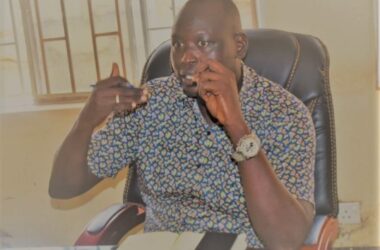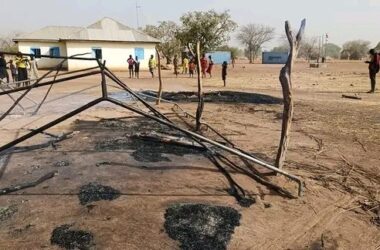By Ephraim Modi Duku Sokiri
An Ad-hoc committee constituted months ago by the Central Equatoria State governor, Emmanuel Adil Anthony to investigate the case of Zain playground confiscation has presented their investigative report on the status of the ground.
Zain playing ground has been for years, a posture for playing football and recreational activities. However, the ground of recent witnessed a drama of ownership after it was stormed by heavy security men in uniform, with heavy weapons earlier this year that created a lot of questions in the mind of masses in Juba.
The Governor’s press secretary, Derick Derickson yesterday said the committee, co-chaired by the State Minister of Cabinet Affairs Wayi Goodwill Edward, dismissed the information that the current state government had sold out the land.
According to him, the committee verified that the land belongs to a community in which it was sold out to an investor in 2012 during the former state government, although the civic society had assumed that it belongs to the public.
“The committee assessed and found out that Zain ground is a community land sold out in 2012 and not a government land and then the community sold it out to an investor like a commercial land and from there the investor also sold it to another investor,” he revealed.
Derick further alluded that a dispute of real owner of the land arose between the community called Nyaing and another unnamed community.
“So, there was a kind of contention between that Nyaing and the other community but according to the findings, the land belongs to the Nyaing community,” he revealed.
“The government wants to clarify that the place is not for the government, it is for the community and they have not made any agreement with any other people and we are yet to find more details and unveil them to the public,” added Derick.
Uncertainty over laws fuel land grabs in South Sudan as much of the scuffles over land arise from a lack of clear land laws and processes after South Sudan gained independence from northern Sudan in 2011, according to Pulitzer Center.
South Sudan Land Act 2009 regulates land tenure and protects rights in land in South Sudan while creating an enabling environment for economic development in the land and natural
resources sectors.
In regards to Chapter II of the country’s land Act, regulation of land tenure, usage and exercise of rights thereon shall be a concurrent competence, exercised at the appropriate level of government in South Sudan.
Rights in the land owned by the Government of Southern Sudan shall be exercised through the appropriate or designated level of government in South Sudan, which shall recognize customary land rights under customary land law.
All levels of government in South Sudan shall institute a process to progressively develop and amend the relevant laws to incorporate customary laws, practices, local heritage and international trends and practices.




